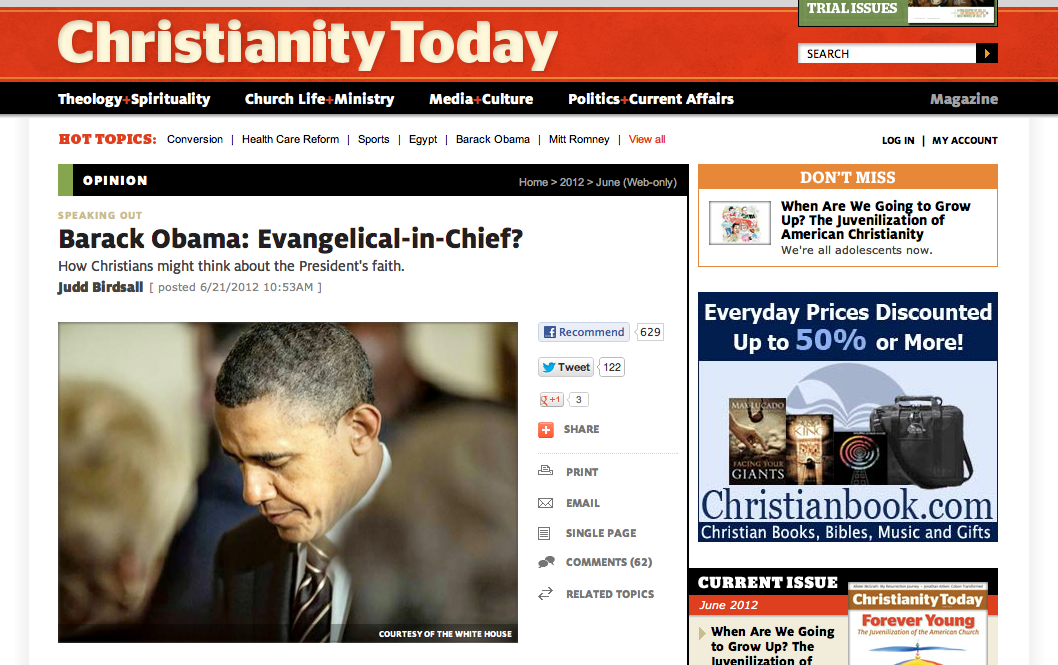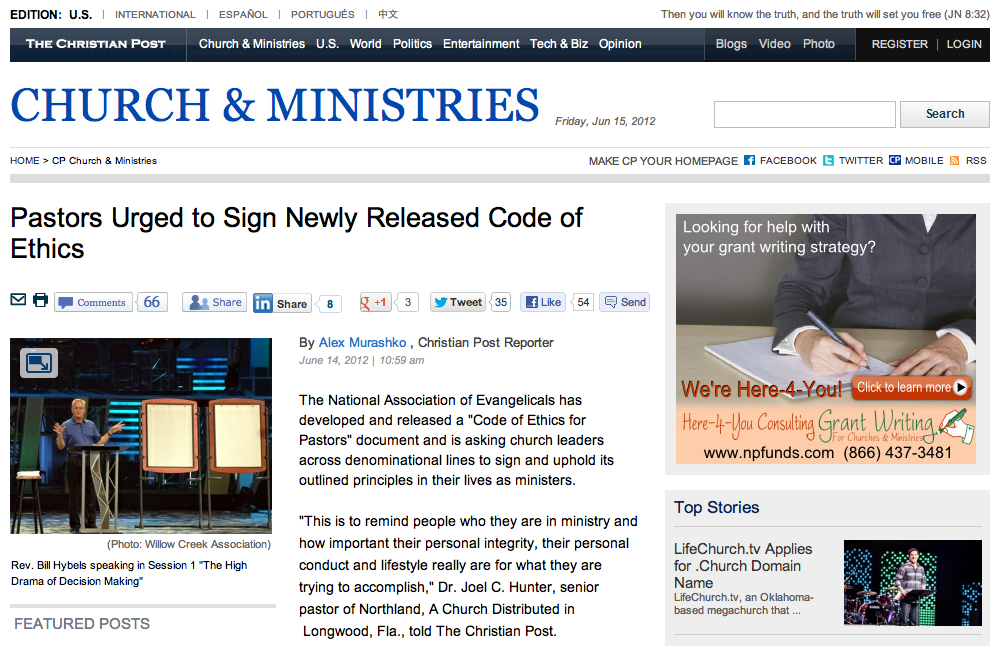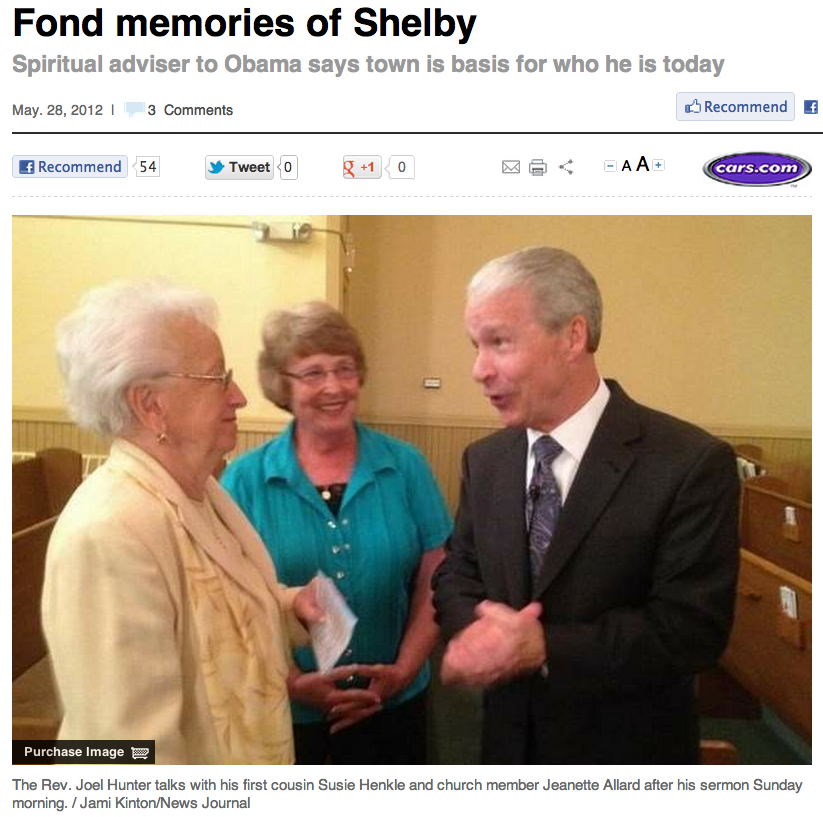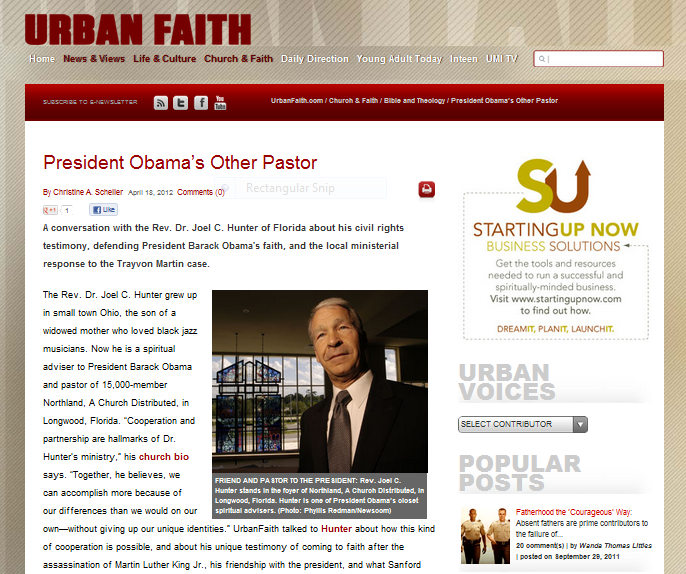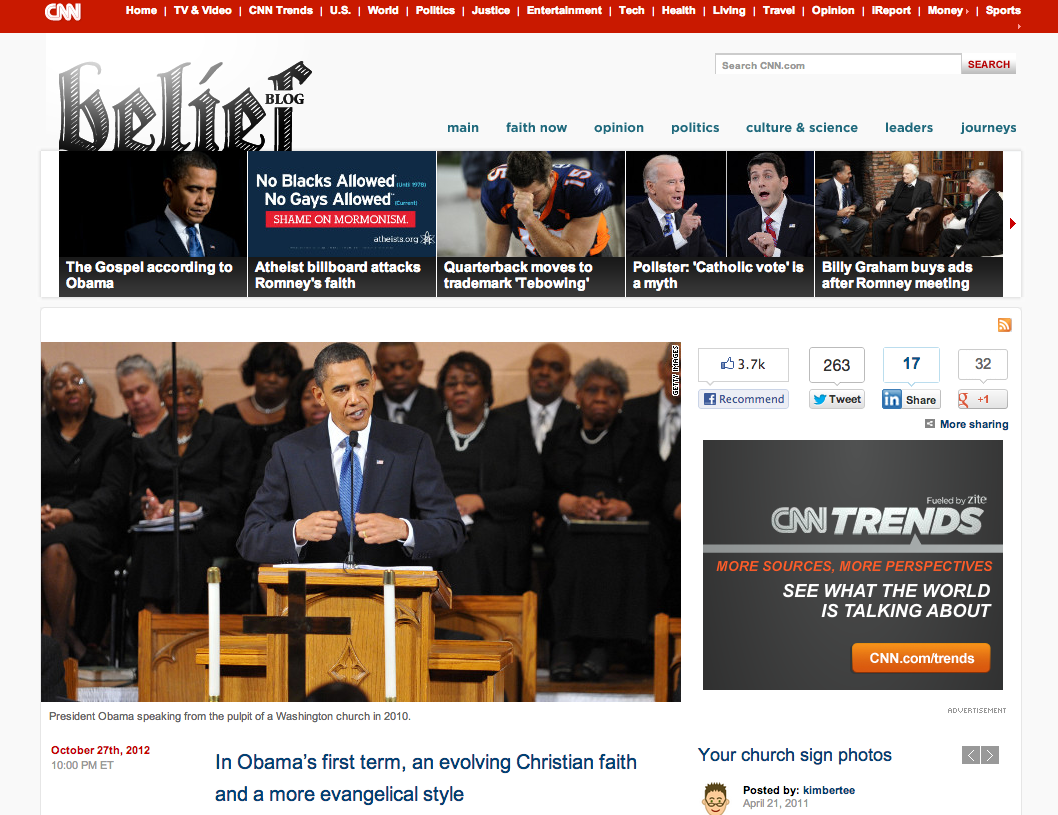 VIEW FULL ARTICLE AND PICTURES AT: http://religion.blogs.cnn.com/2012/10/27/in-obamas-first-term-an-evolving-christian-faith-and-a-more-evangelical-style/
VIEW FULL ARTICLE AND PICTURES AT: http://religion.blogs.cnn.com/2012/10/27/in-obamas-first-term-an-evolving-christian-faith-and-a-more-evangelical-style/
Washington (CNN) - President Obama's prayers for a strong first debate may not have been answered, but that doesn't mean the prayers weren't happening.
Before he stepped onto a Colorado stage earlier this month to face off with Mitt Romney for the first time, Obama joined a conference call with a small circle of Christian ministers.
"The focus of that prayer was, 'Oh, Lord, you know precisely what the president needs to say,'" says Kirbyjon Caldwell, a Methodist megachurch pastor from Texas who helped lead the call. "'You know what this country needs during the next four years.'"
"'And so I would pray that your primary will and words that you want the president to say will fall from his lips,'" Caldwell goes on, recalling his prayer.
Obama, for his part, was mostly silent.
"There's a profound and genuine humility in the presence of Christ himself," Caldwell says, describing the president on such calls. "I think he recognizes it as a holy moment."
It was the second time Caldwell and Obama had prayed by phone in as many months. The two had connected in August on a prayer call Obama has hosted on his birthday every year since coming to the White House.
Welcome to the intense, out-of-the-box and widely misunderstood religious life of President Barack Obama.
Though he famously left his controversial pastor, the Rev. Jeremiah Wright, the year he was elected to the presidency, a handful of spiritual advisers close to Obama say that his time in office has significantly deepened his faith.
Stephen Mansfield, a former Christian pastor who wrote the book "The Faith of Barack Obama," goes so far to say that Obama has experienced a spiritual transformation.
"I think we do have at heart a new man, so to speak," says Mansfield, who worked closely with the White House and with some Obama religious advisers on his book. "He has undergone a pretty significant personal religious change in his first term."
Obama's faith advisers say Mansfield goes a step too far, though they acknowledge that when it comes to his faith, Obama has changed.
"There is a deepening development in his relationship with God," says Joel Hunter, a Florida-based pastor who has been in touch with Obama nearly every week since he took office. "He chooses to stay faithful in daily habits of study and prayer and consistent times of interchange with spiritual leaders."
"I am not sure he did that before he came to the presidency."
Whether or not Obama has been spiritually "reborn" in the evangelical sense, his spiritual counselors say the president's faith has helped shape his first term in ways that haven't been appreciated by voters or the news media.
And they say the presidency is bringing Obama to a new place in his faith - building on a system of belief and practice that helped bring him to the White House in the first place.
Talking like Billy Graham
These days, when the president talks about his faith, he sounds like a born-again Christian.
Addressing the National Prayer Breakfast in Washington this year, Obama recalled meeting the nation's most iconic evangelical Christian, Billy Graham, and described his struggle to find the right words as he prayed aloud with the aging evangelist.
"Like that verse in Romans, the Holy Spirit interceded when I didn't know quite what to say," Obama told the gathering, invoking the New Testament.
It was hardly the only part of the speech where Obama was speaking "Christianese" - employing a lexicon familiar to evangelical Christians, who put a premium on quoting Scripture and communing directly with the Holy Spirit.
At the same breakfast, Obama spoke of spending time every morning in "Scripture and devotion" and dropped the names of "friends like Joel Hunter or T.D. Jakes," both well-known pastors of evangelical megachurches.
"He was talking like Billy Graham" at the breakfast, says Mansfield, who also wrote an admiring spiritual biography of former President George W. Bush.
"While I'm proud of what we've achieved together, I'm far more mindful of my own failings," Obama said in his acceptance speech, "knowing exactly what Lincoln meant when he said, 'I have been driven to my knees many times by the overwhelming conviction that I had no place else to go.'"
Such pious talk marks a departure from how the president discussed his faith life before his White House years.
Back then, Obama cited his religion more as a basis for social action than for spiritual sustenance. He would temper declarations of belief with affirmations of doubt.
Asked in a 2004 interview whether he prayed often, Obama, then a candidate for U.S. Senate in Illinois, responded: "Uh, yeah, I guess I do."
In a 2007 interview with the Chicago Sun-Times, Obama voiced skepticism about Scripture.
"There are aspects of the Christian tradition that I'm comfortable with and aspects that I'm not," he said. "There are passages of the Bible that make perfect sense to me and others that I go 'Ya know, I'm not sure about that.'"
These days, Obama forgoes such equivocations in favor of a full-throated Christianity.
To Mansfield, the evolution of Obama's comments on religion bespeak a born-again experience, prompted largely by the president's break with Wright and his arrival into a circle of spiritual counselors that includes many evangelicals.
The White House declined requests to speak to Obama.
But Hunter, the president's closest spiritual counselor, says Obama has technically been a born-again Christian for more than 25 years, since accepting Jesus at Wright's Chicago church in the 1980s.
But it's in the last four years that the president has become more evangelical in his habits.
He now begins each morning reading Christian devotionals on his Blackberry.
And then there's the circle of pastors Obama has begun praying with before big events like the first presidential debate.
A circle of evangelicals
After landing in Washington following his 2008 election, Obama shopped around for a new church. But he wound up making his spiritual home instead among a circle of far-flung pastors that includes Hunter, Jakes and Caldwell, the minister from Texas.
Conference calls with the group started while Obama was still a presidential candidate, including on the night of his 2008 victory. The president-elect spoke by phone with Hunter and other Christian ministers, rejoicing in victory but also grieving the death of his grandmother, who helped raise him, just a few days earlier.
The migration from Wright - who almost brought down Obama's campaign with videos that showed him sermonizing about "God damn America" and "the U.S. of KKK A" - to this new group, says Mansfield, has been underappreciated.
"[Obama] went into the Oval Office ... questioning the only pastor he'd ever had," Mansfield says. "Wright left him humiliated."
"And there were deeper questions about the theology that [Obama] had received," Mansfield continues. "Some part of Wright's religious orientation had failed."
Where Wright is a liberal mainline Protestant, emphasizing liberation and social action, Obama's new circle of pastors includes theologically conservative evangelicals like Hunter and Jakes, who stress God's grace and personal transformation.
Mansfield notes that the chaplain who has presided for the last few years at Camp David, where Obama spends many Sundays, is also an evangelical.
Some of Obama's spiritual counselors credit Joshua DuBois, executive director of the White House Office of Faith-based and Neighborhood Partnerships, with leading Obama to a more evangelical-flavored Christianity. Caldwell calls him the president's personal pastor.
A former associate pastor at a Pentecostal church in Boston, DuBois is the one responsible for sending Obama Scriptures and scriptural meditations five days a week; Hunter does it on the other two days.
DuBois convenes a daily 8:15 a.m. conference call with pastors to pray for the country and the president, who is not on the call. (Lately, those calls have also included prayers for Mitt Romney.)
And it's DuBois who organized the president's circle of spiritual advisers. After graduate school at Princeton, DuBois talked his way onto Obama's staff at the U.S. Senate, repeatedly driving to Washington to make his case after job applications were rejected.
When Obama launched his presidential campaign a few years later, DuBois was plucked as its faith outreach director.
The 30-year-old White House aide plays down his influence on his boss.
"He has always been on a Christian journey," DuBois says of Obama, "and the challenges of the office, of being leader of the free world, provides a deepening and strengthening of faith, and that's what you see with the president."
"I remember working with him around the Scripture he would use at the memorial service for the miners in West Virginia," DuBois says, referring to the 2010 tragedy that left 29 dead. "These are obviously moments when one's faith is strengthened."
The unparalleled trials of the Oval Office have been known to deepen the religiosity of presidents ranging from Abraham Lincoln to Ronald Reagan.
Hunter says the same thing has happened to this president: "His faith has been growing as the challenges of the presidency have become more naturally the main part of his own everyday life."
One of Hunter's first Oval Office encounters with Obama came shortly after the president took office, at a time when the economy was shedding 750,000 jobs a month.
"He acknowledged at that meeting what many may know but few remember: that by the time issues get to the president, there are no simple or clear answers or they would have been solved by others," Hunter says. "So we prayed."
A few months later, Hunter was in the Oval Office again, noticing that "the unremitting heaviness of the office was setting in."
"I saw something that has been consistent ever since: He cannot just pray for himself and his family," Hunter says by e-mail. "At least I have never seen it. His faith, his heart, always includes those who are being left out through no fault of their own."
Despite the changes they've seen in Obama, both Hunter and DuBois are uncomfortable with the word "transformation" when it comes to Obama's White House faith life.
"The president doesn't deal in labels," says DuBois. "He knows God's grace is sufficient for him and beyond that doesn't get into labels, evangelical or mainline. He's a proud Christian."
Loving God by loving your neighbor
When the Rev. Sharon Watkins and a group of fellow Protestant ministers sat down with Obama at the White House a couple years into the president's term, she knew the pastors would get wonky about religion.
"You get a bunch of ministers in the room and we're all church geeks - it's theological," says Watkins, who along with the other pastors had come to talk about poverty. "But the president got every biblical allusion and reference. ... He's just a person who is biblically and theologically literate."
If Obama's personal theology has grown more conservative, he is inclined to apply it toward liberal political ends.
"I'd be remiss if my values were limited to personal moments of prayer or private conversations with pastors or friends," Obama said at the National Prayer Breakfast in February. "So instead, I must try - imperfectly, but I must try - to make sure those values motivate me as one leader of this great nation."
In signing laws that have increased Wall Street regulations and stopped health insurance companies from rejecting patients with preexisting conditions, Obama said at the breakfast, he wanted to "make the economy stronger for everybody."
"But I also do it because I know that far too many neighbors in our country have been hurt and treated unfairly over the last few years," he continued. "And I believe in God's command to 'love thy neighbor as thyself.'"
Obama went on to frame decisions as disparate as ending tax breaks for the wealthy and defending foreign aid as examples of biblical principles in action, quoting Jesus' teaching that "for unto whom much is given, much shall be required" and invoking the "biblical call to care for the least of these."
That last biblical reference also loomed large in another 2011 White House meeting between Obama and a group of religious leaders. They'd come to urge the president to protect programs for the poor amid his fight with Congress over raising the nation's debt ceiling.
The Rev. Jim Wallis, a progressive activist, recalls the meeting:
In pressing Obama to take cuts to those programs off the table, one Roman Catholic bishop told the president that "the text that we are obliged to obey does not say 'as you have done to the middle class you have done to me.'"
"It says as you've done to the least of these, you have done to me," the bishop said.
"I know that text," Obama responded. The passage is from the Matthew 25 in the New Testament.
"So there was this very rigorous conversation," Wallis says, "and we pressed him on applying Matthew 25 to this decision about protecting those who were the least of these."
Ultimately, the programs that the religious leaders were lobbying for were protected in the debt ceiling deal, though it's unclear how big a role the religious leaders played.
For liberal Christians, such victories embody the justice of the social gospel, the idea that believers should do God's work - even aid the Second Coming - by improving society.
"I do notice that sometimes, like on health care, when [Obama] says it's the right thing to do, it's him saying you love God by loving your neighbor," says Watkins, who leads a mainline denomination called Christian Church (Disciples of Christ). "He's doing the best he can to be guided by God so he can be a faithful follower of Christ."
Skeptics might write off Obama's Bible talk as sanctimonious window dressing, aimed at no higher purpose than connecting with churchgoers in the purple and red states. But translating the Good Book into progressive politics has always been a mainstay of Obama's political biography.
'An awesome God in the blue states'
When Obama landed on Chicago's South Side in 1985 as an idealistic 23-year-old, eager to start work as a community organizer, he was already a political liberal.
He was also a man without a religion, the son of a spiritual-but-not-religious mother whom he would later describe as "a lonely witness for secular humanism" and an estranged African father who was born a Muslim but died an atheist.
Obama's work in Chicago, built around causes like tenants' rights and job training for laid-off workers, was steeped in religion.
His salary was paid by a coalition of churches. And the job took him into many black churches, among the most influential institutions in the neighborhood he was organizing, including Wright's Trinity United Church of Christ.
After a lifelong struggle to fit in, set in motion by his mixed-race parents, Trinity felt like home.
"I came to realize that without a vessel for beliefs, without an unequivocal commitment to a particular community of faith," he wrote later, "I would be consigned at some level to always remain apart."
The changes that Wright's church wrought weren't just personal. Baptism and active membership there equipped Obama with an ability to connect with churchgoers he was trying to organize - and, years later, with religious voters he was trying to win over - in a deeper way.
Wright, who did not respond to interview requests for this story, gave Obama a moral framework for his liberal politics. The pastor espoused a black liberation theology that equates Jesus' life and death with the plight of those who Wright saw as disenfranchised, from African-Americans to Palestinians.
"Wright is the religious version of almost everything Obama already believed without religion," says Mansfield, who spent time at Trinity for his book. "It's a support of oppressed people anywhere in the world."
When Obama emerged on the national stage, his comfortable religiosity and sensitivity to the concerns of churchgoing Americans helped distinguish him as a Democrat.
"We worship an awesome God in the blue states," he declared to huge applause in his keynote address at the 2004 Democratic National Convention, catching the attention of young Christians like Joshua DuBois.
But at that same convention, Obama's party nominated John Kerry, a candidate who eschewed God talk and who lost his own Catholic demographic on Election Day.
Four years later, Obama hired religious outreach staffers like DuBois for his presidential campaign and made a point of meeting with Christian Right leaders who'd never before heard from a Democratic presidential nominee.
Obama went on to win in places like Indiana and North Carolina, evangelical-heavy states that a Democratic presidential nominee hadn't taken in decades.
If the Rev. Wright had almost brought down his presidential campaign, the controversial minister had also long ago laid the groundwork for Obama to connect with the churchgoing voters who had turned their backs on Kerry.
The politics of confusion
As president, the line between Obama's personal convictions and his political prowess on religious matters can sometimes be hard to discern.
Obama invited the conservative evangelical megapastor Rick Warren to give the invocation at his 2009 inauguration, ruffling liberal feathers. He introduced an annual Easter prayer breakfast as a new White House tradition. He gives shout-outs to young evangelical leaders in major speeches.
All can be seen as genuine reflections of Obama's faith and his appreciation for the role of religious leaders in public life. And in a nation where more people believe in angels than in evolution - a fact that the president himself has publicly noted - all promise political benefits.
The same could be said for Obama's predecessor, George W. Bush, and for presidents as diverse as Jimmy Carter and Reagan: All had deep spiritual streaks that enabled the political art of courting religious Americans, especially evangelicals.
The irony, in Obama's case, is that despite his orthodox utterances - there's "something about the resurrection of our savior, Jesus Christ, that puts everything else in perspective," he said at this year's Easter breakfast - polls continue to show widespread confusion about his faith.
Only half the country can correctly identify Obama as Christian, according to one recent Pew poll, while 17% falsely believe he is a Muslim.
"He's a Christian and he professes his Christian faith - I don't know what else this man has to do to get that into folks' ears," says Caldwell, who was also close to George W. Bush.
But Obama's public piety has helped him bond with young evangelical leaders, who are less tied to the GOP than their parents' generation.
"I was struck by the specificity of what he described in terms of theology and what it means to him," says Gabe Lyons, one such leader, describing a White House Easter breakfast he attended. "His message is very specific and very orthodox."
Where exactly that new orthodoxy comes from - the pressures of the White House, a new circle of religious advisers or, to a certain degree, from political calculation - may become clearer after Obama's presidency, if he opens up about such matters.
Until then, the president is likely to keep speaking "Christianese" - and resisting Christian labels. Dan Gilgoff - CNN Belief Blog Co-Editor

